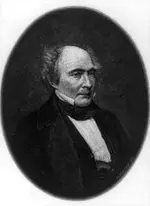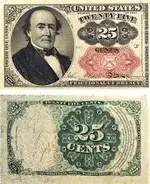Appointed Governor of Kansas Territory in April 1857, but resigned in December 1857; United States financial agent to Europe
1863-1864;
Walker was a speculator in cotton, land and slaves.

He became politically prominent during the nullification crisis, and from 1836 to 1845 he sat in the United States Senate as a
Unionist Democrat. (copperhead) Being an ardent
expansionist, he voted for the recognition of the Republic of Texas in 1837 and for the joint annexation resolution of 1845, and advocated the nomination and election of James K. Polk in 1844. (slave owning president) Walker favored
the award of public lands to new states; endorsed a
low tariff; opposed distribution of the federal surplus funds for fear of creating an excuse to raise tariff rates; and, significantly,
supported the independent Treasury system idea. He also
opposed the Bank of the United States. All of which fits the profile of the K.G.C.'s intentions during that specific period of time. Walker was a passionate defender of slavery, both for economic benefits, and because he believed Negroes would fall into turpitude or insanity without firm masters. He claimed that independent Texas had to be annexed to prevent it from falling into the hands of Great Britain, which would use it to spread subversion throughout the South. He warned northerners that if Britain succeeded in undermining slavery, the freedmen would go north, where "the poor-house and the jail, the asylums of the deaf and dumb, the blind, the idiot and insane, would be filled to overflowing." (K.G.C. sentiments)
As Treasury Secretary, Walker financed the Mexican-American War and drafted the 1849 bill to establish the United States Department of the Interior. He supported the Union cause during the American Civil (
?) War and in 1863 and 1864, as financial agent of the United States, did much to create confidence in Europe in the financial resources of the United States. During this time Walker was instrumental in securing a loan of $250,000,000 from the German Confederation. One example of financing the Mexican-American war can be seen in correspondence; he wrote to Major General William Orlando Butler, "February 23, 1848. Sir, Upon the ratification of a treaty of peace by the Republic of Mexico in conformity with the provisions of the act of the congress of the United States of America approved March 3, 1847 stated 'an act making further appropriation to bring the existing war with Mexico to a speedy and honorable conclusion' you are authorized to draw on this department for any sum not exceeding three millions of dollars to be paid in pursuance of the promotion of said act." He also supported the independent Treasury system, pushed for a tariff for revenue, and
established a warehousing system for handling imports that has had lasting influence. (Rebel Supplies in mass quantity were obtained this way)
The Tariff of 1842, or Black Tariff as it became known, was a protectionist tariff schedule adopted in the United States to reverse the effects of the Compromise Tariff of 1833. The Compromise Tariff contained a provision that successively lowered the tariff rates from their level under the Tariff of 1832 over a period of ten years until the majority of dutiable goods were to be taxed at 20%. As the 20% level approached in 1842, industrial interests and members of the Whig Party began clamoring for protection, claiming that the reductions left them vulnerable to European competition. The bill restored protection and raised average tariff rates to almost 40%.
The bill stipulated sweeping changes to the tariff schedule and collection system, most of which were designed to augment its protective character. The law replaced most ad valorem rates with specific duties assessed on a good-by-good basis. It also
repealed the credit system of tariff finance and replaced it with a cash payment system, collected at portside customs houses. ( Copperheads loved cash) Walker County, Texas, was named in his honor. However, due to his support of the Union during the Civil War, the Texas Legislature withdrew the honor and honored Samuel Walker, a Texas Ranger, instead. This kind of thing can not be helped if you can't tell everybody you are a copperhead. They will start to believe you really are not one of them (Democrat) and loose faith in your policy.
L.C. Baker











